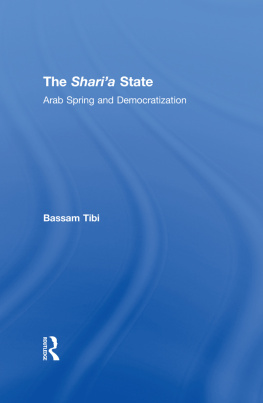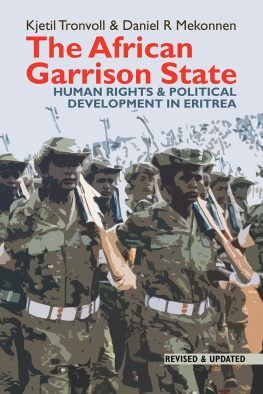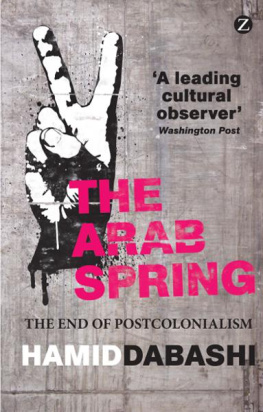
ARAB SPRING
Critical Interventions: A Forum for Social Analysis General Editor: Bruce Kapferer
Volume 1
THE WORLD TRADE CENTER AND GLOBAL CRISIS
Critical Perspectives
Edited by Bruce Kapferer
Volume 2
GLOBALIZATION
Critical Issues
Edited by Allen Chun
Volume 3
CORPORATE SCANDAL
Global Corporatism against Society
Edited by John Gledhill
Volume 4
EXPERT KNOWLEDGE
First World Peoples, Consultancy, and Anthropology
Edited by Barry Morris and Rohan Bastin
Volume 5
STATE, SOVEREIGNTY, WAR
Civil Violence in Emerging Global Realities
Edited by Bruce Kapferer
Volume 6
THE RETREAT OF THE SOCIAL
The Rise and Rise of Reductionism
Edited by Bruce Kapferer
Volume 7
OLIGARCHS AND OLIGOPOLIES
New Formations of Global Power
Edited by Bruce Kapferer
Volume 8
NATIONALISMS BLOODY TERRAIN
Racism, Class Inequality, and the Politics of Recognition
Edited by George Baca
Volume 9
IDENTIFYING WITH FREEDOM
Indonesia after Suharto
Edited by Tony Day
Volume 10
THE GLOBAL IDEA OF THE COMMONS
Edited by Donald M. Nonini
Volume 11
SECURITY AND DEVELOPMENT
Edited by John-Andrew McNeish and Jon Harald Sande Lie
Volume 12
MIGRATION, DEVELOPMENT, AND TRANSNATIONALIZATION
A Critical Stance
Edited by Nina Glick Schiller and Thomas Faist
Volume 13
WAR, TECHNOLOGY, ANTHROPOLOGY
Edited by Koen Stroeken
Volume 14
ARAB SPRING
Uprisings, Powers, Interventions
Edited by Kjetil Fosshagen
ARAB SPRING
Uprisings, Powers,
Interventions
Edited by
Kjetil Fosshagen
Paperback edition published in 2014 by
Berghahn Books
www.berghahnbooks.com
2014 Berghahn Books
All rights reserved.
Except for the quotation of short passages for the purposes of criticism and review, no part of this book may be reproduced in any form or by any means, electronic or mechanical, including photocopying, recording, or any information storage and retrieval system now known or to be invented, without written permission of the publisher.
Library of Congress Cataloging-in-Publication Data
A CIP catalogue record for this book is
available from the Library of Congress.
British Library Cataloguing in Publication Data
A catalogue record for this book is
available from the British Library.
Printed in the United States on acid-free paper.
ISBN 978-1-78238-465-6 (paperback)
ISBN 978-1-78238-466-3 (ebook)
CONTENTS
Introduction: The Arab SpringRevolution
or 1848 Reaction?
Kjetil Fosshagen
Tahrir as Heterotopia: Spaces and Aesthetics
of the Egyptian Revolution
Paola Abenante
Beyond the Arab Spring: The Aesthetics and Poetics
of Popular Revolt and Protest, 20102012
Pnina Werbner, Martin Webb, and
Kathryn Spellman-Poots
Emergency Law and Hypergovernance: Human Rights
and Regime Change in the Arab Spring
Michael Humphrey
The Promises and Limitations of Economic Protests
in the West Bank
Sobhi Samour
Stability or Democracy? The Failed Uprising in Bahrain
and the Battle for the International Agenda
Thomas Fibiger
The Turkish Model for the Arab Spring:
The Corporate Moralist State
Kjetil Fosshagen
INTRODUCTION
The Arab SpringRevolution or 1848 Reaction?
Kjetil Fosshagen
The first crucial question about the so-called Arab Spring revolutions asks whether they can be considered social revolutions in the historical and political sense, in that they promised and introduced a radically new social order. This definitional problem is compounded by the fact that the word revolution has become part of everyday popular discourse about change. The second question asks whether there is a structure of social forces underneath the apparent chaos of the Arab Spring uprisings and their aftermath. Liberal discourse in the West hailed the Arab Spring as revolutionary within the idealistic scenario of despotism versus democracy. The revolts have also been celebrated as significant democratic and social events by radical commentators such as iek (2012) and Badiou (2012). The latter sees the riots as pre-political events marking the rebirth of history, since their occupation of central spaces grounded a vision of a new and lasting social order. For Badiou, rioting is the only possible shape of historical action at the present moment in capitalisms history.
A positive view on the potentiality of the revolts is shared by two articles in this volumeone by Paola Abenante and one by Pnina Werbner, Martin Webb, and Kathryn Spellman-Poots. These two contributions analyze how the aesthetics, performance, and use of space in the revolutionary moments in Egypt (Abenante) and beyond the Middle East (Werbner et al.) opened up new practices and visions of the political.
Despite the clear strength and breadth of the Arab uprisings and their links to protest movements and earlier labor strikes, they did not produce coherent political organizations or socially radical policies. The emergent regimes at best expanded individual political rights, most importantly for the middle classes. However, the military and security apparatuses remained intact; in Egypt, they even joined the liberal, secular factions and struck back with great force against the elected government. In short, the broad social uprisings appear to end up like the 1848 revolutionsthat is, as bourgeois revolutions and not as social revolutions. In order to grasp the dynamics of the uprisings, it is necessary to widen the analytical scope and locate the dynamics of national Arab revolts within transnational and global assemblages that have profoundly reconfigured the socio-economic and political spaces of many nation-states in the last decades. Analyses confined to national borders and internal politics tend to overlook crucial deterritorializing dynamics that cut across national borders and reconfigure internal processes. Such a perspective risks internalizing the process by attributing it to population growth, economic fluctuations, food prices (see Mitchell 1991), or overbearing local despotism.













